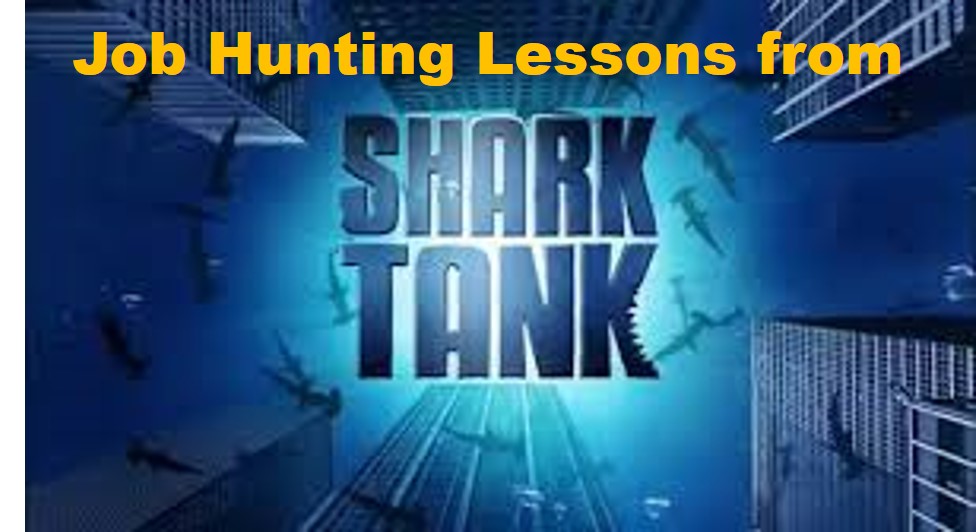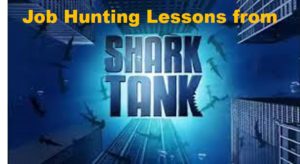Career Lessons from “Shark Tank”

Job Hunting Lessons from “Shark Tank”

In several articles, I’ve connected job hunting issues to some reality shows, including “The Profit,” “Kitchen Nightmares,” and “Bar Rescue.” I’ve been remiss in not examining possible lessons from “Shark Tank,” perhaps because of a larger number of episodes and the need to review several from the different perspectives of a job seeker and a recruiter. You may think that “Shark Tank” is a platform for entrepreneurs to pitch their product, to be challenged by the “Sharks,” and hopefully make a deal. But that’s exactly what every job seeker is trying to do: get the interview and make the sale. There are multiple lessons to be learned from the behaviors of both “the Sharks” and a multitude of entrepreneurs who pitch products.
Know Your Numbers
There are numerous reasons why individuals don’t get offers on “Shark Tank” – just like there are numerous reasons why individuals don’t get job offers. Many times, the “Sharks” don’t see the “marketability” of the product. Likewise, an organization frequently eliminates a candidate based on missing skills or experience.
However, one of the glaring errors that appears on “Shark Tank” is someone unfamiliar with the “numbers” of their existing or proposed business. There have also been multiple examples of individuals “withholding” true numbers resulting in sharp criticism and almost automatic dismissals.
For job seekers, there are a lot of emerging trends: changes in resume formats, virtual interviews, and “fast-track” hiring to name a few. One change that has clearly emerged is the focus on “accomplishments” not just skills and experiences. The focus on “accomplishments” means that results are specific, with measurable numbers – just like the ones demanded in the “Shark Tank.”
If you’re going to make a claim, on your resume or LinkedIn profile, or in an interview, you need be prepared to answer some tough questions:
- What was the result in the last month, the last six months?
- What’s the trend? Explain why it’s increasing! Or decreasing!
- Exactly what did you do to create this result?
- Who else was involved in creating that result?
I’ve been surprised by the number of examples in “Shark Tank” where that last question revealed something very important – and frequently damaging – information.
As a job seeker, you cannot “hope” that an interviewer won’t probe for the details of your accomplishments. Better yet, you should be presenting these details upfront with your accomplishments on your resume — and with your interview answers.
Be Prepared
This point is obviously related, a broader perspective on the “Know Your Numbers” message. Interestingly, “Shark Tank” provides numerous examples of great examples of preparation. This is a very valuable source of information for job seekers – numerous examples of calm, serious, and detailed presentation of an idea – and numerous examples of “over-the-top,” crazy presentations. There are a lot of examples of what to do – and not to do – as part of an interview.
While there are some questions posed on “Shark Tank” for dramatic effect, or occasional comic relief, the overwhelming percentage of questions are serious, direct questions intended to provide critical information. The “Sharks” are experienced (and wealthy) entrepreneurs with extensive experience in starting, funding, and growing businesses. This translates to skilled interviewers asking direct questions – with opportunities for job seekers to observe how these questions are answered. Some participants clearly try and avoid answering questions. It doesn’t work in the “Shark Tank;” it’s unlikely to work in a job interview.
One example of a successful presentation from two individuals: they recorded numerous “Shark Tank” episodes, then stopped the recording after each question, and practiced how they would answer the question. Multiple episodes, multiple times practicing with a partner! That’s good practice.
Unfortunately, “Shark Tank” is also a laboratory of examples where individuals “on the carpet” just aren’t prepared with responses to basic questions.
Arrogance or Superman?
Two other problems appear on “Shark Tank.” After receiving several resumes that contained lists of 25 or more “skills” and others that contained long lists of “awards,” I addressed the possible issues in two articles, suggesting that Superman (or Wonder Woman) doesn’t belong on your resume and cautioning that a resume with too many “awards” may come across as arrogance. There was one presenter who responded to multiple challenges on his strategy with alternatives with “I can do that.” The “Sharks” quickly got frustrated with his “I’ll do anything you suggest” approach and were quick to go “out.” Similarly, presenters showing a high level of arrogance, telling the “Sharks” they’re “wrong,” never succeeds. The “Sharks” have all the power (and all the money), just like HR and the Hiring Manager have all the power (and all the money).
While not frequent, I’ve noticed several presentations where, when challenged by the “Sharks” about the potential value of their product, respond with “I’ve got another idea.” These presenters are criticized for being “all over the place” or “lacking focus.” One the other hand, successful presenters are almost always sharply focused on a single idea with the depth of a real vision for the product, or a family of products that are clearly connected to a brand.
Feedback
Getting feedback is a significant problem for job seekers. Feedback on your resume or LinkedIn profile from potential employers is extremely rare, often non-existent. Feedback on an interview is often limited to hearing nothing or: “We’re going in a different direction,” “We’re not interested.” In the “Shark Tank,” feedback is frequent, direct, and often brutal. It’s frequently mixed, with positive feedback coming from some “Sharks” and negative feedback coming from others.
There are two issues here: the importance of getting feedback and the importance of responding to feedback correctly. The first of these, getting feedback, is the bigger challenge for job seekers.
You can ask recruiters, HR staff, and hiring managers for feedback on an interview – it’s almost impossible to even ask for feedback from these people on your resume or LinkedIn profile. You might hear something vague like “good job” or even “we see you as a good candidate,” but that is still not specific.
Therefore, it is important for job seekers to identify and connect with individuals who are qualified and willing to provide honest, tough feedback. It must go beyond friends or relatives “expertise” in crafting a resume or LinkedIn profile. It must go beyond “three easy tips” for your resume or interview.
Receiving feedback is equally important. Again, “Shark Tank” clearly works at preparing presenters to simply thank the “Sharks,” for both positive and negative feedback – and for being “out.” But it doesn’t always work that way as there are frequent examples of presenters arguing with “Sharks.” I’ve always been impressed by how performers so professionally respond to applause, often simply nodding, standing openly and inviting more. “Shark Tank” provides equally valuable examples of presenters leaving without realizing the value of the feedback they’ve been given, and in most of these cases, leaving without a deal. Arguing with an HR Recruiter or a Hiring Manager is likely going to result in the same thing – leaving without a job offer.
Networking
The “Sharks” are ultimate masters of networking and job seekers can learn by just watching how they network with each other, sometimes combining for deals, and how each of them builds a network of products, e.g. products to be sold on television, and how they even combine entrepreneurs with other businesses they own. They seem to be constantly looking for synergies that will help businesses grow.
For job seekers, networking can be difficult and time-consuming. Yet it’s the most important part of your career search. According to Lou Adler, one of the top experts on hiring and recruiting, there are two job markets. The better jobs are in a hidden job market compared to the online market where jobs are posted. Adler recommends a “20/20/60” job search plan. He recommends spending 60% of your job hunt networking. The other 40% is split between responding to online posts and developing your resume and LinkedIn profile.
LinkedIn has become a primary networking site. It’s also the virtual networking site where individuals build connections, exchange e-mails with possible connections, access articles, and search for those 2nd and 3rd linked members who might be important for you to connect with directly. “Shark Tank” provides interesting insights on looking for not just networking opportunities but networking synergies based on common interests and objectives.
Conclusion
“Shark Tank” is a successful and enjoyable show for many reasons. Some very interesting lessons can be extracted by job seekers by watching the behaviors of both the “Sharks” and the participants, by watching the episodes through the multiple lenses of resume and interview preparation.
About the author
Jim Schreier is a management consultant with a focus on management, leadership, including performance-based hiring, interviewing skills, and retention strategies. He’s the author of “Interview Audition for Your Next Job.”
Visit his websites at www.farcliffs.com and www.212-careers.com.
